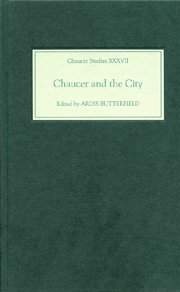1 - Chaucer and the Detritus of the City
from INTRODUCTION
Published online by Cambridge University Press: 05 February 2013
Summary
As I write, Bruce Nauman's exhibit Raw Materials is just closing at the Tate Modern on Bankside directly across the river from St Paul's. He has used the vast echoing space of this former industrial turbine hall to create an aural sculpture in which fragments of twenty-two of his earlier works are uttered in great swirling, billowing mutterings over and between the heads of the gallery's visitors. The work recalls the interlocking, repetitive patterns of the music of Steve Reich, particularly City Life (1995). Three of the sections of City Life are built around samples of language, including short snatches of the live communication between firemen on duty when the World Trade Center was bombed in 1993. Mixed with these abrupt commands and exclamations are a cacophony of other New York city sounds: alarms, street vendors, car horns, pile drivers, slamming doors, boat horns and buoys. Nauman mixes in city life slightly differently in Raw Materials by allowing the sound sculpture to absorb the live voices of the visitors. The continually flowing incantations of old texts are augmented and distorted by the spontaneous talk of people passing through the hall; no one hears the same sequence, volume or pitch of sounds because they change according to the auditor's position as well as the unpredictable numbers and noise levels of visitors at any one moment on any one day.
Both works use texts, but not merely for their own sake. The aural space of the Turbine Hall takes over the textual ‘raw materials’ provided by Nauman and subdues them to the larger demands of experiencing sound through space.
- Type
- Chapter
- Information
- Chaucer and the City , pp. 3 - 22Publisher: Boydell & BrewerPrint publication year: 2006

